Protests At Princeton May Lead To Admitting Uncomfortable Truths About Woodrow Wilson
Protests by students at Princeton are causing some people to finally pay attention to some inconvenient truths about America's 28th President.
In the latest example of campus protests regarding racial and cultural issues that recently gripped places such as the University of Missouri, protests by students at Princeton University are calling for a reevaluation of the legacy of one of the Ivy League school’s most prominent legacies:
PRINCETON, N.J. — Few figures loom as large in the life of an Ivy League university as Woodrow Wilson does at Princeton.
As the school’s president in the early 20th century, Wilson initiated its expansion into a full-scale university. He lifted educational standards, created academic majors and introduced the small-group classes, often led by professors, known as precepts.
To honor him, Princeton created the Woodrow Wilson School of Public and International Affairs — an elite institution within an elite institution — and a residential complex, Wilson College, where quotations from the revered leader have been displayed on a television screen in the dining hall.
So central is Wilson to Princeton’s identity that a theatrical revue performed for freshmen pokes fun at the obsession. “Come into our Wilsonic Temple, a sacred space devoted entirely to our 28th president!” a fervent Wilsonite tells visitors in a skit.
But until posters started appearing around campus in September, one aspect of Wilson’s legacy was seldom discussed: his racist views, and the ways he acted on them as president of the United States.
The posters, put up by a year-old student group called the Black Justice League, featured some of Wilson’s more offensive quotes, including his comment to an African-American leader that “segregation is not humiliating, but a benefit, and ought to be so regarded by you,” and led to a remarkable two days at this genteel campus last week.
After a walkout by about 200 students, and the presentation by the Black Justice League of a list of demands, about 15 students occupied the office of the president, Christopher L. Eisgruber, overnight on Wednesday. On Thursday, Mr. Eisgruber agreed to begin discussions on campus and with trustees about the demands.
At the top of the group’s list was a demand that the university “publicly acknowledge the racist legacy of Woodrow Wilson” and take steps to rename the public policy school and residential college.
While naming decisions are up to the university’s board of trustees (which includes Mr. Eisgruber), Mr. Eisgruber promised to push for removing a large mural of Wilson from the residential college’s dining room and to direct the trustees to survey “the campus community’s opinion” on the Wilson School name and then vote on it.
The protesters also called for mandatory courses on “the history of marginalized peoples,” for “cultural competency training” for the staff and the faculty and for the creation of dedicated housing and meeting space for those interested in black culture.
But as Princeton takes its turn in the national roll call of college campuses where long-festering issues of race have burst into the open, spurred by events in places like Ferguson, Mo., and Charleston, S.C., it is not surprising that the conversation would pivot around Wilson, an alumnus.
“In some ways, that’s the role that symbols play in American politics and culture,” Mr. Eisgruber said in a phone interview on Sunday before sending an email addressing the issue to the university community. “People become very invested in symbols. And one of the benefits of having a genuine public discussion, informed by scholarly opinion, about some of these questions is that it can help educate people about problems that go beyond the symbol in our society.”
For most Americans, to the extent that Woodrow Wilson is remember some 100 years after serving as President it is as the man who served as President of Princeton for eight years before moving on to a brief time as Governor of New Jersey before becoming only the second Democrat elected President since the end of the Civil War in 1912, in large part only because Republican voters were divided by a feud between President William Howard Taft and former President Theodore Roosevelt. During his time in office, WIlson became known for the implementation of several changes in the Federal Government that remain with us today, such as the Federal Reserve Board and things such as the ratification of the 17th Amendment providing for the direct election of Senators. Perhaps Wilson’s largest legacy though, for ill or good depending on one’s perspective, was the role he played in America’s eventual entry into World War One. After pursuing a policy of alleged neutrality that was heavily biased in favor of Great Britain, and campaigning on the idea that he had kept the nation out of war, Wilson was seeking a declaration of war from Congress within a month after beginning his second term and played a significant role in the negotiation of the Treaty of Versailles before seeing his legacy fall apart when the U.S. Senate rejected American entry into the League of Nations. Largely hidden from the history books until recently, though, was Wilson’s long history of racism, which played a significant role in his time in office at all levels:
Perhaps best known for leading the United States during World War I and for trying to start the League of Nations, Wilson as president rolled back gains blacks had made since Reconstruction, removing black officials from the federal government and overseeing the segregation of rank-and-file workers.
Raised in the South, he wrote of “a great Ku Klux Klan” that rose up to rid whites of “the intolerable burden of governments sustained by the votes of ignorant Negroes.”
During Wilson’s tenure as president of Princeton, no blacks were admitted — “The whole temper and tradition of the place are such that no Negro has ever applied,” he wrote — though Harvard and Yale had admitted blacks decades earlier. Princeton admitted its first black student in the 1940s.
As President of the United States, Wilson also made sure that the military units that were sent to Europe to fight in World War One were strictly segregated on the basis of race, and that African-Americans were largely relegated to menial tasks such as cooks and laborers rather than being given combat positions, never mind the opportunity to ever rise up in the Ranks. And, as PBS once reported, as President Wilson also hosted a screening of D.W. Griffith’s The Birth Of A Nation laudatory movie about the Ku Klux Klan, praising it and what it depicted:
On the evening of March 21, 1915, President Woodrow Wilson attended a special screening at the White House of THE BIRTH OF A NATION, a film directed by D.W. Griffith and based on THE CLANSMAN, a novel written by Wilson’s good friend Thomas Dixon. The film presented a distorted portrait of the South after the Civil War, glorifying the Ku Klux Klan and denigrating blacks. It falsified the period of Reconstruction by presenting blacks as dominating Southern whites (almost all of whom are noble in the film) and sexually forcing themselves upon white women. The Klan was portrayed as the South’s savior from this alleged tyranny. Not only was this portrayal untrue, it was the opposite of what actually happened. During Reconstruction, whites dominated blacks and assaulted black women. The Klan was primarily a white terrorist organization that carried out hundreds of murders.
After seeing the film, an enthusiastic Wilson reportedly remarked: “It is like writing history with lightning, and my only regret is that it is all so terribly true.” African-American audiences openly wept at the film’s malicious portrayal of blacks, while Northern white audiences cheered. The film swept the nation. Riots broke out in major cities (Boston and Philadelphia, among others), and it was denied release in many other places (Chicago, Ohio, Denver, Pittsburgh, St. Louis, and Minneapolis). Gangs of whites roamed city streets attacking blacks. In Lafayette, Indiana, a white man killed a black teenager after seeing the movie. Thomas Dixon reveled in its triumph. “The real purpose of my film,” he confessed gleefully, “was to revolutionize Northern audiences that would transform every man into a Southern partisan for life.”
To a large degree, this aspect of Wilson’s Presidency, as well as the extent to which his views on race impacted no just his time at the Oval Office but his entire life, isn’t something that seems to have become part of the publicly acknowledged legacy of the 28th President of the United States until rather recently. To the extent most Americans have learned anything about Wilson during their education, it consists largely of the domestic and foreign policy legacy I take note of above, along with the health crisis that gripped his seventeen months in office after suffering an apparent stroke in September 1919, an event that essentially confined him to the White House and by some accounts may have led his wife and principal aides to make decisions for him while concealing his condition from the public. His racist legacy, and the extent to which he used his power as President to implement, went largely unknown and certainly conflicted with the historical image that developed that painted him as a fore-bearer of the modern Democratic Party.
Indeed as Damon Root notes at Reason this weekend, it’s long past time for people well beyond Princeton to reexamine Wilson’s true legacy:
Not everyone is quite so eager to see Wilson knocked off his pedestal, however. Writing at Politico Magazine this week, left-wing New York University professor Jonathan Zimmerman attempted to defend the beleaguered 28th president by reminding the ungrateful student activists about Wilson’s pioneering progressive agenda. Sure, Wilson may have been a racist, Zimmerman admitted, but “the Progressive doctrines espoused by Wilson” ushered in a new era of activist government that was ultimately “reflected” and enshrined in Franklin Roosevelt’s New Deal. Wilson was a founding father of modern liberalism, Zimmerman insisted, and therefore “deserves a good deal of credit” for improving the lives of “America’s poor and dispossessed, including minorities.”
I never cease to be amazed when I encounter this sort of liberal apologia for Woodrow Wilson. This is the same Woodrow Wilson, after all, who imposed Jim Crow on the federal government, praised segregation, glorified the Ku Klux Klan, spied on innocent Americans, censored the mail, trashed the Bill of Rights, and imprisoned multiple critics for the “crimes” of giving speeches, writing editorials, and distributing pamphlets. As H.L. Mencken once remarked about the ugly record of another unlikely liberal hero, Justice Oliver Wendell Holmes Jr., “If this is Liberalism, then all I can say is that Liberalism is not what it was when I was young.”
The upshot of Zimmerman’s article seems to be that Wilson’s racism should be weighed separately from his progressive agenda. But in fact the two were inseparably linked. And that was not just true for Wilson. The entire Progressive movement had aterrible record on race. Many progressives either shared Wilson’s hostility to African Americans or were essentially indifferent to the plight of blacks. In the South, as historian David Southern has noted, vile practices like disfranchisement, segregation, and lynching all “went hand-in-hand with the most advanced forms of southern progressivism.” Wilsonian progressives basically built their welfare state for whites only.
Dick Lehr at The Atlantic has a long essay about Wilson’s racist past, that includes the story of how the President threw a prominent civil rights leader out of the Oval office:
As president, Wilson oversaw unprecedented segregation in federal offices. It’s a shameful side to his legacy that came to a head one fall afternoon in 1914 when he threw the civil-rights leader William Monroe Trotter out of the Oval Office.
Trotter led a delegation of blacks to meet with the president on November 12, 1914 to discuss the surge of segregation in the country. Trotter, today largely forgotten, was a nationally prominent civil-rights leader and newspaper editor. In the early 1900s, he was often mentioned in the same breath as W.E.B. Du Bois and Booker T. Washington. But unlike Washington, Trotter, an 1895 graduate of Harvard, believed in direct protest actions. In fact, Trotter founded his Boston newspaper,The Guardian, as a vehicle to challenge Washington’s more conciliatory approach to civil rights.
(…)
Trotter would not be dismissed; he was not one to find being surrounded by white people, and the trappings of power either alien or intimidating. He had been the only black in his class at Hyde Park High School outside Boston (where, regardless, he had been elected class president) and, at Harvard, outperformed most white classmates, some of whom had since become governors, congressmen, rich, and famous. Instead, he tried to steer the meeting back on track. “I am pleading for simple justice,” he said. “If my tone has seemed so contentious, why my tone has been misunderstood.” He said they needed to work this out, given that he and other African American leaders had supported Wilson’s presidential run at the polls.
But Wilson was angry, stating that bringing up politics and citing black voting power was a form of blackmail. The meeting, which had lasted nearly an hour, was abruptly over. The delegation was shown the door—essentially thrown out. When the incensed Trotter ran into reporters milling around Tumulty’s office, he began letting off steam. “What the President told us was entirely disappointing.”
The story about the dustup between the president and the Guardian editor went viral. The New York Times’s front-page story was headlined, “President Resents Negro’s Criticism” while the front-page headline in the New York Press read: “Wilson Rebukes Negro Who ‘Talks Up’ to Him.” But the larger point was that his tough-talking landed Trotter back on front pages everywhere.
Wilson realized almost instantly his error—unfortunately, not the error of his racism, but the error in public relations. He had “played the fool,” he told a cabinet member afterwards, by becoming unnerved in the face of what he considered Trotter’s impertinence. “When the Negro delegate (Trotter) threatened me, I was a damn fool enough to lose my temper and point him to the door. What I ought to have done would have been to listened, restrained my resentment, and, when they had finished, to have said to them that, of course, their petition receive consideration. They would then have withdrawn quietly and no more would have been heard about the matter.”
Even after that part of Wilson’s legacy became better known, though, it seems as though Princeton University continued to celebrate Wilson as the idealist that he had once been known, and many on the left seem eager to argue that Wilson’s legacy on race should be largely ignored because of the “good” that he did. To that extent, it is somewhat understandable why minority students would be troubled by the school’s failure to acknowledge the truth about Wilson and the calls for changes in the way he is remembered at the school seem entirely reasonable. There’s a danger in going to far, of course, and some of the calls that would effectively involve scrubbing Wilson from official memory at Princeton entirely seem to be over the top to me. On the whole, though, after a century it seems like more than appropriate to acknowledge the truth about Woodrow Wilson, both at Princeton and in the nation as a whole. Perhaps, in the process, we can also reexamine the flawed decision making on his part in getting American involved in a war that was none of our business and the consequences that Wilson’s decision in that regard has had for American foreign policy for the policy As they, the journey of a thousand miles begins with the first step and this seems like a good first step.
The post was updated to include the article from The Atlantic.
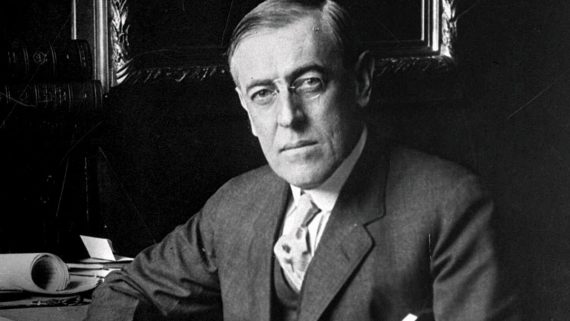

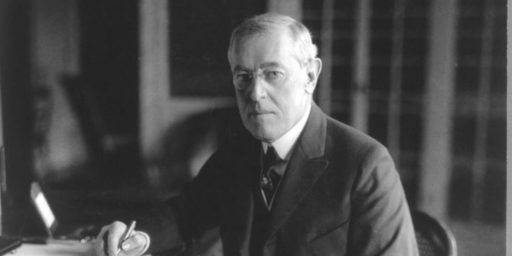
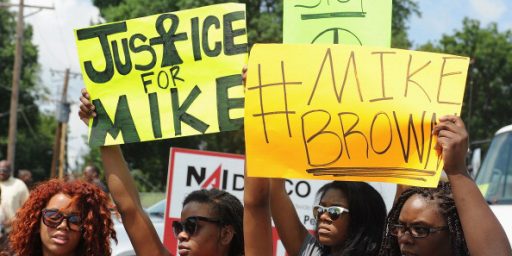
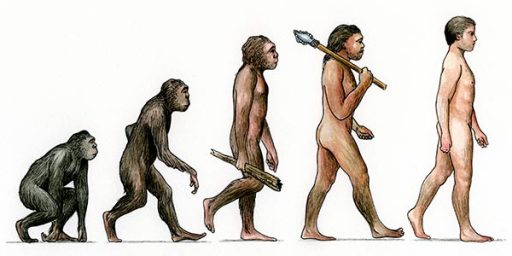
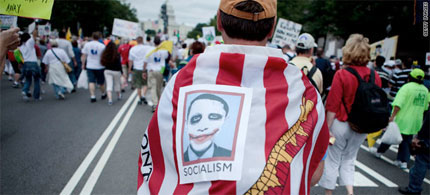
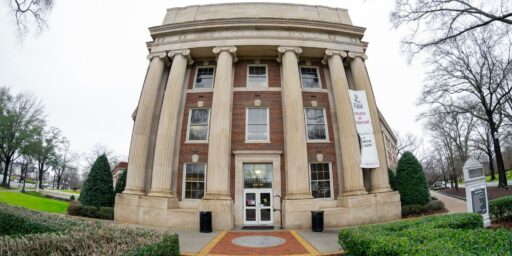
This deal of digging up dirt on people who are long gone seems to be increasing. It is so convenient to bring up this junk when people are no longer around to defend themselves. I guess next will be Washington, Franklin (partier), Lincoln, Jefferson, Grant (native American policies), Teddy Roosevelt (hunter), Franklin Roosevelt (smoked cigarettes). It has already started.
According to the logic and attitudes of some people, buildings and monuments should be named after people who are perfect.
And I wonder just who these students at Princeton propose renaming the building after ?
From the recent events at some college campuses, it appears students have too much time on their hands. They need to get back to class and hit the books. Quit wasting their parents’ money.
I am very, very leery of imposing modern moral codes on figures from history. But Wilson really was a bit much, even for his era. We’re not naming colleges after Nixon and he was no more toxic.
How about this guy:
We could say the same about citizens who turn out at campaign rallys for
Trump the Chump!
@ernieyeball:
I don’t know if Trump is a chump. His fan club members certainly are. Trump’s Chumps.
@michael reynolds:
I agree. Lincoln expressed what would now be considered racist sentiments. But I don’t think we should send a wrecking crew to demolish the Lincoln Memorial. Nor the Lincoln Tunnel. Nor petition the White House to change the name of the Lincoln Bedroom.
@ernieyeball: I was thinking of the great Knute Rockne, or Jim Thorpe.
I not a Wilson fan, but he did help win WW1 and tried to start an organization that might have prevented WWII. And I don’t recall any scandals when he was president.
Anyone who is in favor of the spread of demonstrably preventable disease is a chump in my book.
Donald Trump Spouts Dangerous Anti-Vaccine Nonsense.
http://www.forbes.com/sites/stevensalzberg/2015/09/20/donald-trump-spouts-dangerous-anti-vaccine-nonsense-ben-carsons-response-is-worse/
@michael reynolds:
I agree, but … even by the standards of his time, Wilson was uniquely bad. He *re*segregated much of the government, which resulted in demotions, huge paycuts and sometimes physical isolation of black people working in government. And that’s not even the total extent of his awfulness. He was a President with a unique hatred of personal liberty, including jailing dissenters. The Espionage and Sedition Acts were awful and he enforced them with true awfulness.
Funny. I can remember just a few years ago when hating on Wilson was sure sign that you were a right wing looney tune.
@ernieyeball:
A chump is a sap. A sucker. A boob who can be taken in a by a carny barker, which is what Trump is. I can think of a lot of words to describe Trump–boor, oaf, demagogue–but it’s his fan club who are the chumps.
My New Oxford American Dictionary.
Chump: a foolish or easily deceived person.
Don John Boy Typhoid Trump the Chump is a fool for promoting his inane anti-vaccine stance.
As others have said, I believe in evaluating historical figures by the standards of their time. By the standards of his time, Wilson was deeply racist.
I don’t think the university should remove Wilson’s name. It definitely should, however, alter the representations of Wilson to acknowledge his racism and reject it.
@Hal_10000:
James Loewen is a right wing looney tune?
https://twitter.com/JamesWLoewen/status/667356692968054784
The left never liked Wilson. The suppression of movements like the IWW in that era was generally thought to be with his tacit and frequently overt approval. The execution of Joe Hill was considered to be a lynching under color of law by many leftists. The left was opposed to entryinto WW I considering it a capitalist squabble that was based on making money and empires with the blood of the working class. Wilson make some public declarations against the war but clearly worked to involve the US as evidenced by Willian Jennings Bryant’s resignation as Secretary of State in protest which was the last time an American Secretary of State acted honorably in opposition to Presidential folly.
The guy was a racist, war mongering, suppressor of the working class. However, it has been a hundred years. The Democratic party has tried to smooth over his legacy and paint him as a progressive. I think the truth should be known more widely. Changing a few building names does not matter much to me. Princeton is a leading center of learning, and every person associated with that institution should understand the whole truth.
Why not add for discussion Wilson’s empowerment of modern propaganda and its role in converting an anti-war public into rabid German-haters within 18 months; that such techniques continue to be used by the public relations industry to control thought every single day and that the Bush Administration used said techniques to manufacture majority support for its invasion of Iraq? That these techniques continue to maintain a racist power structure by keeping whites racist?
When I was in college I finally learned that even by the standard of his day and time Wilson was extremely racist. And if that was not enough, it could be argued that Wilson marked the beginnings of modern surveillance-state efforts to gather information about domestic dissidents – the 1919 Palmer Raids by Wilson’s DOJ were intended to intended to round up, arrest and deport leftists, syndicalists and anarchists from the United States.
Wilson is my least favorite “great” president of the Twentieth Century.
@Kari Q:
Not me. I believe in evaluating historical figures by my standards. That doesn’t mean I mark them as evil incarnate or promote them to sainthood, just that I like to look at people honestly, warts and all, in the context of the times in which they live. I also do it with a large dose of self awareness as I too am just another flawed human being living at a time with it’s own shortcomings.
@Slugger: We are in an age of some sort of false “cleansing” of virtually any and every historical references to leaders of the past. Look at the attacks on Andrew Jackson. The same thing is happening to Washington, Jefferson, Adams, and other past leaders. Buildings, monuments, parks, mountains, and streets are being renamed. Monuments taken down. All of this being pushed, not by a majority of people, but by misguided groups who have some sort of agenda. And the news media is tied up in it too: propaganda. We even see it in schools, where any sort of study and discussions of all sides and angles of historic events is silenced. In some schools the mention and study of any historical weapons is prohibited. What did they think people used in battles back then – squirt guns ? A teacher dare not propose different arguments, ideas, and opinions. Whatever they say and teach now had better be “politically correct” according to the history police.
Next they will start on the WW II era leaders and generals. That is when a lot of people will finally be fed up and put a stop to this nonsense. There are still too many of us around who have direct connections, memories, and relatives from then. We will not allow them to be slandered.
It is easy and convenient to attack and denigrate someone when they are no longer around to defend themselves. Enough !
I think the amazing thing about Wilson is that historians usually rank him in the top ten of US Presidents, including a poll of historians taken just this year. I think it just supports Gene Healey’s theory that the best way to be a well-regarded President is to get involved in unnecessary wars an expand your power (e.g., Wilson, Jackson). The best way to be a regarded as a mediocre President is to preside over eight boring years of peace and prosperity (e.g., Clinton, Cleveland, Coolidge).
I will be curious to see how history treats Bush II in this regard. I give it about ten years before we see the first, “actually, Bush was under-rated” think pieces.
@Tyrell:
The problem is that a lot of what you see as the ‘true’ history of various folks from the past is really hagiography, hero worship, mythology.
The solution long-term is to stop whitewashing historical figures for propaganda reasons – something done by both Left and Right – and try to keep the teaching of history closer to the facts. This would lead to a far better understanding of history, and it would lead to greater tolerance of the sins of many historical figures since they would be counterbalanced by equally unfortunate truths about other historical figures. The truth would provide context.
@Kari Q:
I’m not sure that’s accurate. By the standards of OUR time, Wilson was deeply racist. By the standards of his own time, he wasn’t that far removed (if he was removed at all) from the American mainstream.
The Birth of a Nation, for example, which is a deeply, blatantly racist film pulled in somewhere between $1.2 billion and $2.4 billion (in today’s dollars) in box office receipts. No movie which is that transparently racist pulls in that much cash unless the public likes what it’s seeing.
KKK membership peaked during the 1920s, with more than 4 million members during a time that the white US population was about 95 million (and some of those such as Catholics would have been targets of the Klan.) Wilson wasn’t exactly an outlier by the standards of the day.
@michael reynolds: I will drink one on that.
If I were a student, I’d be satisfied with making sure WW’s racist views and anti-worker views were widely known. Since he wasn’t elected for his racist views, I’m not too happy with renaming the program/building. Has a little too much of the Soviet “we will wipe you out from history” aspect to it. Why can’t we just admit that WW was both a good man and a bad man, and leave it at that?
If the State of Missouri can rename The Mark McGwire Highway in St. Louis to The Mark Twain Expressway after the still living McGwire exposed himself to be the lying SOB that everyone already knew he was, Princeton can change the name of campus buildings so that they do not immortalize a dead racist.
http://www.riverfronttimes.com/newsblog/2010/05/14/mark-mcgwire-highway-to-be-renamed-after-mark-twain
@ernieyeball:
If we renamed things associated with all the bigoted leaders in this country’s history almost every monument in DC would be unrecognizable! Instead, I totally agree with michael reynolds: comment. We really need to stop holding these historic public figures as “gods” and see them for what they really were – Influential people that did not get it all right. From that, we might actually learn something about our history and become better going forward. Part of the problem is we don’t like to recognize some of the stink associated with these historical figures. Therefore, we have an inability to diagnose the problems that exist to this day resulting from it. Thus, our inability to effectively move forward.
Better that the nation’s future baristas and waiters be protesting a long dead president than making porno flicks and smoking ganja like chimneys, I guess. Although clearly the Feds need to stop propping up these increasingly absurd institutions with cheap money student loans. We’re creating a generational sub-demographic of lifelong nitwits. White upper middle class de facto welfare and sociopathic cases. These kids instead should be sent to work in the salt mines. Literally. Would do them a lot of good.
As for Wilson, his viewpoints on race pretty much are the same as the Democrat Party’s (unpublished) viewpoints about race along with its white constituents, even to this very day.
Policy wise, Wilson was a disaster. Basically the precursor for FDR’s disastrous domestic agenda, much of which still is destroying our economy. Wilson also waited waaaaay too long to enter WWI. Botched the peace, too, which in turn directly led to WWII, the worst conflagration in history. Wilson probably is the second worst Democrat president in the last five generations, although obviously one can make a strong case for Carter, too. That schism between Taft and T. Roosevelt had catastrophic ripple effects. Boggles the mind.
This sub-demographic of nitwits already exists. It is called the Tea Party.
And yes, we all would be better off had they made porno flicks and smoked ganja like chimneys.
White upper middle class de facto welfare and sociopathic cases. Fits them to a Tea.
If the German Gardens subdivision on Long Island NY can change the name of Adolph Hitler St. to Park St. Princeton can change the name of campus buildings so that they do not immortalize a dead racist.
I can just see the OTB 35 years from now when…..(screen fades to black goes wavy)…. “the Harvard Trustees decided to rename the Barack Obama Law School back to plain old Harvard Law School after it was pointed out by gay activists that for the first 5 years of his admin, he was AGAINST GAY MARRIAGE.”
No matter that he “saw the light” in 2014, the Trustees felt that his obvious homophobia precluded his name on such a prestigious institution.
Also, the social studies program unilaterally decided that history books heretofore will refer to Barack Obama as the first “half white President” since black poverty, unemployment and income inequality seriously increased during his Presidency, thus making silly the whole “first black President” meme popular at the turn of the century.
@Bill Lefrak:
I have to admit, you had me going for a while. I actually thought you were a real person posting real views. My bad that you had to stretch that far to tweak me, but hey — given some of the real opinions floating around in Foxland, you can’t blame me that much for not catching on sooner.
Next up – changing the names of Fort Bragg, Fort Lee, Fort Eustis is a start for military bases – as mentioned previously, Lincoln Memorial, FDR, Lincoln Tunnel – white house should be changed to some other color or just call it “The House”
By all means protest – get the word out about the beliefs and politics of these men but requiring a cultural competency course? Dedicating meeting space and housing to discuss black culture though? Then there could be housing for Chinese students (US history wasn’t nice to them), also Japanese (internment history and this was just 70 or so years ago), Russians, Hispanics.
We could have all these different housing areas for those who are interested or are part of one ethnic group and wait, that didn’t work out well before.
I love Trump – not his politics – no way I could support a guy with those politics – but between him and Ben Carson, I like watching the downfall of the GOP.